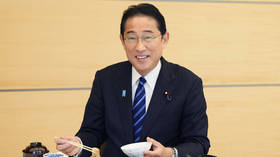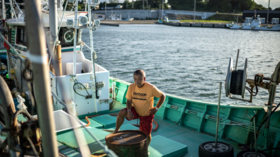
Fumio Kishida consumed fish sashimi from the area in an effort to dispel concerns over the release of treated radioactive wastewater

Japan’s Prime Minister Fumio Kishida © Handout / Cabinet Public Relations Office / JIJI Press / AFP
Japanese Prime Minister Fumio Kishida has attempted to demonstrate the safety of treated radioactive wastewater released from the Fukushima nuclear power plant by eating a selection of food from the area.
Kishida and three of his cabinet ministers sat down on Wednesday for a lunch at which they ate sashimi made from flounder, octopus, and sea bass all caught off the coast of Fukushima following last week’s wastewater release. They also had a selection of fruit, vegetables, and rice recently harvested in the region.
“This is very good,” Kishida told reporters during the meal, calling on people to enjoy “safe and delicious” Japanese seafood and support the northeastern prefecture.
The publicity stunt comes after Japan began the release of treated wastewater from the Fukushima power plant into the Pacific Ocean last week, sparking tensions with China, South Korea, and North Korea.

Read more
Beijing responded to the step by issuing a blanket ban on all Japanese seafood products, arguing that Tokyo had failed to prove that the discharged water was safe. Chinese officials called the move “extremely selfish and irresponsible,” and suggested Japan should use the water for domestic purposes if it was so sure of its safety.
China’s special administrative regions of Hong Kong and Macau have also banned the import of Japanese products from 10 prefectures. South Korea, which already had restrictions on Japanese seafood imports, said it would keep the measures in place. North Korea, meanwhile, accused Tokyo of committing an “unforgivable crime against humanity,” insisting that the move was a threat to the safety and future of all humankind.
Tokyo has insisted that the water is safe and that its plan was approved by the UN. The International Atomic Energy Agency (IAEA) has also stated that the amount of tritium contained in the wastewater was far below the operational limit, and that the effect of its release into the ocean would be “negligible” on people and the environment.
Fukushima plant operator Tokyo Electric Power (TEPCO) also published test results on Thursday claiming that the water contained up to 63 becquerels (a unit of radioactivity) of tritium per liter – far below the WHO drinking water limit of 10,000 becquerels per liter.
The Fukushima Daiichi power plant was critically damaged in 2011 after the 9.0-magnitude Tohoku earthquake and a devastating subsequent tsunami. The plant experienced a catastrophic meltdown, becoming the worst nuclear disaster since the 1986 Chernobyl incident.




